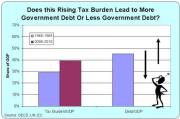
July 22, 2013
Are Higher Taxes Solving Fiscal Problems?
7/22/2013 12:01:00 AM
The budget deficit this year is projected to be significantly smaller
than it has been in recent years and some of our statist friends claim
that this shows the desirability and effectiveness of higher taxes.
I’m not persuaded, mostly because our big long-run fiscal challenge is a rising burden of government spending. And the fact that federal tax revenue is gradually climbing back to the historical norm of about 18 percent of GDPdoesn’t change the fact that we have a looming entitlement crisis – as illustrated by very sobering estimates from the BIS, OECD, and IMF.
I discuss the implications of tax revenue in this interview Charles Payne of Fox News.
There was no opponent to debate, so here are some additional details on issues that were discussed in the interview.
 Higher taxes lead to higher spending – Theevidence from Europe is very compelling about the tendency of politicians to spend more money whenever more revenue is an option. Heck, even the New York Times accidentally admitted that
tax hikes encourage bigger budgets rather than less red ink. It’s
theoretically possible, of course, for politicians to raise revenue
without raising spending, but the starve-the-beast researchsuggests it’s quite unlikely.
Higher taxes lead to higher spending – Theevidence from Europe is very compelling about the tendency of politicians to spend more money whenever more revenue is an option. Heck, even the New York Times accidentally admitted that
tax hikes encourage bigger budgets rather than less red ink. It’s
theoretically possible, of course, for politicians to raise revenue
without raising spending, but the starve-the-beast researchsuggests it’s quite unlikely.
Retroactive tax hikes can raise revenue…in the short run – I think California voters made a big mistake last November when
they voted to impose a top state income tax rate of 13.3 percent. And
that punitive regime almost surely won’t raise much if any revenue in
the long run as high-income people flee the state.
But that’s a long-run effect. In the short run, the Prop 30 tax hike
will generate revenue – particularly since the tax hike was retroactive.
As I said in the interview, there aren’t supply-side effects when
higher tax rates are imposed on income that was earned in the past. But
it’s just a matter of time until the Laffer Curve bites politicians in the butt.
Nothing else matters if government spending grows faster than the private sector – Okay, that’s an exaggeration, but regular readers know that I hope “Mitchell’s Golden Rule”
will be my legacy to fiscal policy. To be more specific, good things
happen in the long run if government spending grows by, say, 2 percent
each year and the private sector expands faster, perhaps 5 percent
annually. Click here to see a video that
shows how nations such as Canada and New Zealand made big progress by
fulfilling the rule. Unfortunately, the United States has headed in the opposite direction during the Bush-Obama years.
P.S. If the United States had implemented something similar to Switzerland’s successful spending cap, we would be in a far stronger fiscal policy position today.
No comments:
Post a Comment